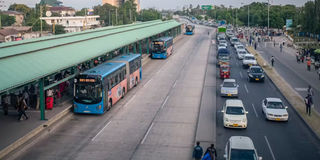Prime
Tanzania seeks $260 million from Green Climate Fund for Bus Rapid Transit expansion

What you need to know:
- The proposed BRT phase six, valued at $260 million, will focus on extending current lanes and expanding routes to improve accessibility in Dar es Salaam.
Dar es Salaam. Tanzania is currently negotiating with the Green Climate Fund (GCF) to secure $260 million to finance the sixth phase of the country’s ambitious Bus Rapid Transit (BRT) project.
According to the Dar es Salaam Rapid Transit Agency (Dart) CEO, Mr Athuman Kihamia, the funding will support four key segments of the project, designed to expand and enhance the city’s BRT infrastructure.
The proposed BRT phase six, valued at $260 million, will focus on extending current lanes and expanding routes to improve accessibility in Dar es Salaam.
The planned segments cover 33.5 kilometers in total and include the routes from Morocco to Kawe; Kimara Mwisho to Kibamba; Mbagala to Vikindu and Dawasa (Tegeta) to Bunju.
“We are currently negotiating with the GCF, and if everything goes well, we expect to announce the financier by December this year.
Our goal is to secure a financier with an affordable repayment interest rate,” Mr Kihamia said in an interview with The Citizen.
The GCF, known as the world’s largest dedicated fund supporting climate-related projects, provides financial resources to developing countries for low-emission and climate-resilient initiatives.
Dart’s pursuit of GCF funding aligns with the Tanzanian government’s commitment to environmentally friendly urban transport solutions.
Most of the new BRT buses will operate on Compressed Natural Gas (CNG), reducing carbon emissions and enhancing fuel efficiency.
To support this green transport vision, Dart is committed to acquiring high-capacity buses that meet international standards.
These buses will operate on dedicated lanes, ensuring faster travel times, greater reliability, and efficiency for Dar es Salaam’s urban commuters.
Mr Kihamia emphasized that these enhancements would help create a safer, more reliable, and environmentally sustainable public transportation system.
In addition to the sixth phase, Tanzania is already making strides with previous BRT expansions.
In December 2022, the government announced that it had secured approximately Sh650 billion from development partners to implement the fourth and fifth phases of the project.
Earlier this year, in June 2023, then-Minister of State in the President's Office (Regional Administration and Local Government), Angellah Kairuki, confirmed that Tanzania was in talks with the GCF to fund BRT expansions through 2025.
Ms Kairuki noted that other countries are studying Dar es Salaam’s BRT model, which underscores Tanzania’s leadership in urban transportation innovation.
“The government is committed to ensuring the continuous implementation of the project,” she stated during a PO-RALG Parliamentary Committee inspection of BRT phase three construction.
This phase includes a 23.6-kilometer stretch from Nyerere-Gongolamboto Road to the city center, as well as a section along Uhuru Road from Tazara to Kariakoo-Gerezani.
The BRT project, once fully completed across six phases, is expected to serve over 90 percent of Dar es Salaam’s population, providing an efficient transport alternative for millions of residents.
While only Phase one is currently operational, Phase two construction has been completed and is expected to begin operations soon.
As Tanzania’s capital city grows, the BRT network is a crucial part of its urban development strategy, easing congestion and advancing the country’s commitment to sustainable and inclusive infrastructure.




